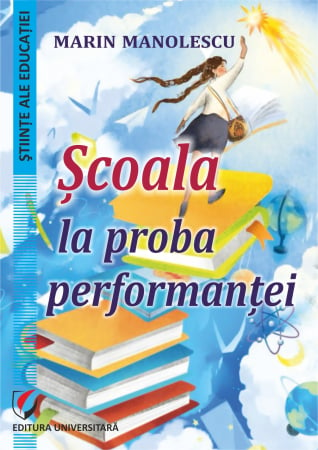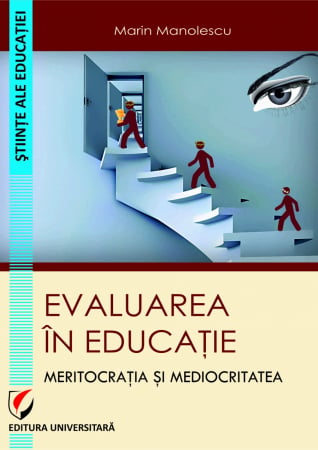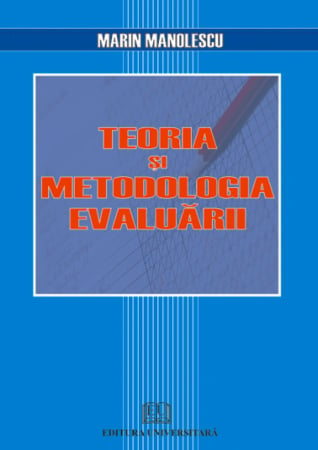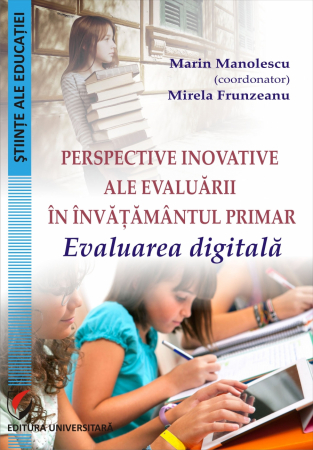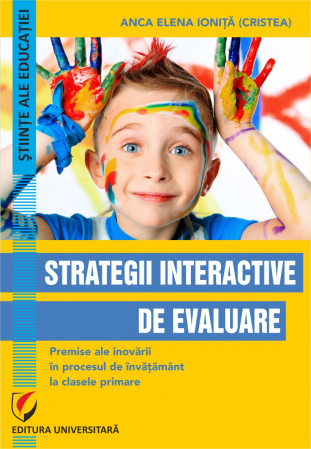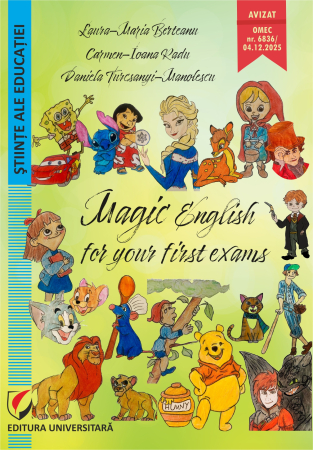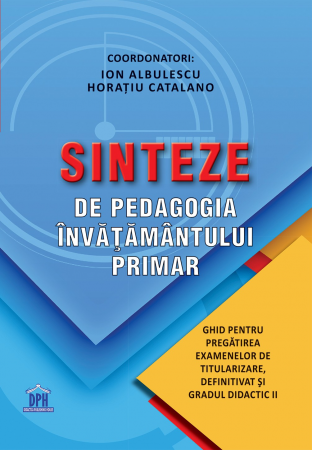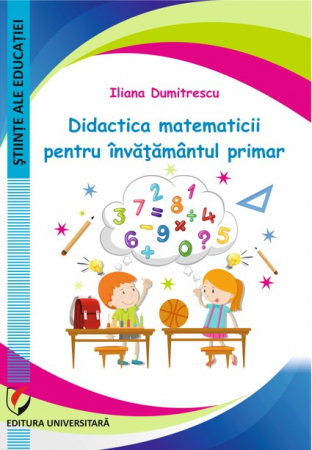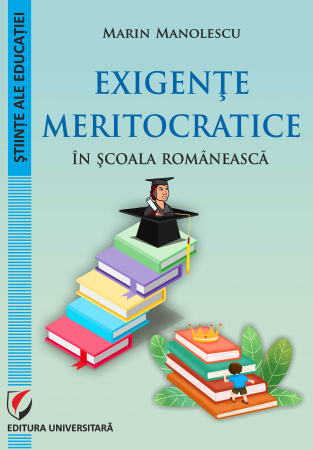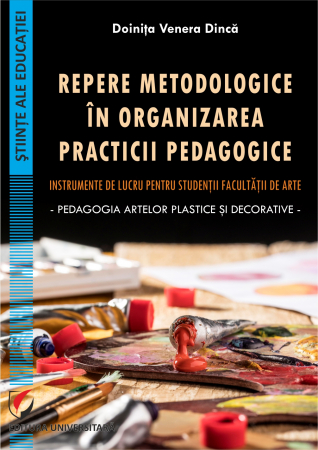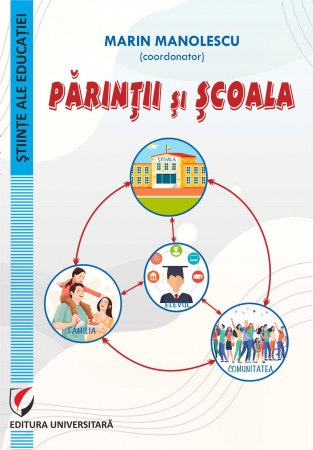Manuscript proposals: [email protected] / 0745 204 115 //// Tracking orders Individuals / Sales: 0745 200 357 / Orders Legal entities: 0721 722 783
6359.png) Quality management and leadership in preschool education. Investigative strategies and innovative-motivational values - Ioan Neacsu, Monica-Mihaela Bescu
Quality management and leadership in preschool education. Investigative strategies and innovative-motivational values - Ioan Neacsu, Monica-Mihaela Bescu
6359.png)
ISBN: 978-606-28-1476-2
DOI: https://doi.org/10.5682/9786062814762
Publisher year: 2022
Edition: I
Pages: 204
Publisher: Editura Universitară
Author: Ioan Neacsu, Monica-Mihaela Bescu
Product Code:
9786062814762
Do you need help?
0745 200 357
- Description
- Download (1)
- Authors
- More details
- Content
- Reviews (0)
At least four value nuclei give relevance to the work and are imposed on the conscience and interest of our readers. First: Theoretical-methodological foundations, with solid scientific foundations and references to research of Romanian and foreign representatives, reference names in the fields of management and educational leadership. Second: The methodological design of the topic approach, offering an operational-empirical, statistical and diagnostic-prognostic improvement. Third: The research and the actual content of the supporting arguments, made by balancing the strength of the data with their creative interpretation, usable in the field of reference - the management and innovative leadership of human resources interested in the preschool universe. Fourth: The project of an original training program for teaching and managerial resources designed to ensure the quality of preschool education.
The research argument is based on the idea that all school managers should know the labyrinth of educational management before taking this leadership position through competition, to master the theory and values of professional practice (knowledge, skills and competencies) to effectively lead the actors involved in achieving quality of preschool education. At the same time, the desire to progressively approach, through mental actions and formative practices, the leadership qualities of the manager, of adequate strategies for positive motivation through creative alternatives promoted in the functioning of school institutions in Romania is activated.
The ideational constructions of the thesis are original, motivating and useful for a wide category of potential or real players in the position / profession of manager-leader recognized in the Romanian education system.
Prof. univ. emeritus Dr. Ioan Neacsu
The research argument is based on the idea that all school managers should know the labyrinth of educational management before taking this leadership position through competition, to master the theory and values of professional practice (knowledge, skills and competencies) to effectively lead the actors involved in achieving quality of preschool education. At the same time, the desire to progressively approach, through mental actions and formative practices, the leadership qualities of the manager, of adequate strategies for positive motivation through creative alternatives promoted in the functioning of school institutions in Romania is activated.
The ideational constructions of the thesis are original, motivating and useful for a wide category of potential or real players in the position / profession of manager-leader recognized in the Romanian education system.
Prof. univ. emeritus Dr. Ioan Neacsu
-
Quality management and leadership in preschool education. Investigative strategies and innovative-motivational values
Download
Prof. univ. emeritus Dr. IOAN NEACSU
Prof. Dr. MONICA-MIHAELA BESCU
Prof. Dr. MONICA-MIHAELA BESCU
1. The first question: What is not our work? Some brief answers:
i. It is not a textbook designed and written to provide too much of what should be known and practiced by a competent kindergarten teacher. But hopefully there will also be an introduction!
ii. It is not a work focused on and about the total active consciousness necessary for a manager and leader in full agreement with the duties and directives of his superiors. But he hopes to bring it closer to a reasonable average!
iii. It is not a pedagogical enterprise about what the functional mind of a director / manager means - fully functional leader in the exercise of the function, but awakened only after leaving office. But hope for a more timely welcome!
iv. It is not the control tower of the vulnerabilities and the criticizable evolutions of the managerial conducts, compensated by the searches oriented towards relational ‑ intelligent solutions with the world of the actors from preschool and early education. But he hopes for the best awareness of the small experiential warnings, relatively discreetly presented and interpreted in the pages of the authors.
v. It is not the most handy software of intelligently identifying solutions of initiatives in penetrating the labyrinths of the management of institutions for early education / pre‑ and preschool, with contextual successes and failures, as we have gone through learning recently all, especially parents. But we will have time to find their joints and solutions more accessible to those in many vulnerable areas of rural Romania!
you. It is not the simplest research model chosen and presented, putting together hypotheses and investigations on essential issues of management and leadership frequently involved in solving priority objectives of the kindergarten, as well as careful examination of some mistakes / errors related to management. , however, essentially aiming at the successful application of the win ‑ win!
are you coming. It is not a proportional ‑ comparative reflection of the values of the past and present in terms of managing the professional relations of teachers - parents - children. But he hopes that at least in the future there will be reforms aimed at an education in nature that is much more extensive, less hyperprotective, freer in inventiveness, in ensuring the resilience, health and development of children in a challenging environment!
viii. It is neither the first nor the last open-door laboratory to create an alchemy of emotionality / soul and innovation as we would like, more integrated with time management and machinery, too full of nanotechnologies and playful mazes away from the mechanisms of time allotted to learning through play, exploratory action, by deviations from the too algorithmic rules of preschool programs.
ix. It is only a small project ‑ designed to reorganize the connection of solidarity of neural synapses (over 150,000 billion), intended to recover from losses due to mismanagement, chronic stressful addictions partially resulting from mental poverty, unprofessional professionally influenced by negative family practices, not recovered functionally over time, with loss estimates at over 85,000 neurons / day, according to Marco Magrini (2021). But, our message can be a signal of a possible late warning, generating a necessary impetus for managerial reforms and the mindset of the unprofessional governess.
2. The second question: But can we build innovative mental, interpretive or practical alternative innovative alternatives useful to generate greater efficiency of management and leadership in preschool institutions? Here are some possible answers:
i. The order of the creative spirit in the education of the beginnings urges an incessant movement of the options for multiple actions in search of the identity, of some conditions of overcoming the context often full of searches of the real causality and of the reasonable solutions. Surely we will find favorable, explanatory and applicative contexts for the reform of the managerial, intellectual-methodological structures, of some stimulating means preparatory to respond rationally to the affective anxieties of the actors, some natural, natural, others subjectively amplified.
ii. The consciously active and responsible conscience of the last years of early childhood education has identified enough problems with implications and critical status in respecting the direct psychoeducational logic of preschool education, without measures to address warnings about lack of parental and didactic experience of parents, financial investments, of the impossibility of overcoming the needs of professional training at the opportune time, of the reduction of the material precariousness, of widening the areas of freedom of the managerial decisions assumed too difficult. The rulers responded with too much decision-making power, without resorting to possible solutions to accept the confidence of introducing the imaginative and inventive spirit of teachers, producer of original knowledge and action, transfer in the preparation of the child-parent couple. Formal management did not become in solidarity with the public opinion on saving creative leadership, it did not highlight the historical pedagogical doctrine proven by the history of early education quite old in Romania, which experienced many social and community difficulties.
iii. The signals we have allow the combination of the informal with the non-formal and formal standards, establishing inventive analysis methodologies in the knowledge of intelligent managerial practices, in effective didactic training of first skills and empirical skills, through guided training, direct or can satisfy the progress in achieving Preschool missions, can reduce the school risk of the manifestations of the function of kindergarten director, promote the virtues of releasing constraints, motivate the discovery of entering the positive logic of managerial rigors, flexible logic of creative logic of teaching cognitive, metacognitive and emotional progress.
iv. Managerial thinking, as designed / desired to be specific to the preschool principal, will be dependent on the path of combining the imaginative with the unimaginative necessary in overcoming the rules of administrative bureaucracy, sometimes decisively oscillating, too persistent in noncreative rules (algorithms), time consuming and unnecessary human effort.
v. The pedagogical and managerial intuition can also make its place in the area of formal management, in the leadership associated with the useful and beautiful formative presented in the intentionality of the school programs, complete with positive motivation, applicative extension, original applicative style. Many of the interventions of the specialists in the field remain pending, multiple experiences aiming at the unity, durability and sustainability of the applications in the area of the action of the managers of the preschool institutions. The public wants a broad consultancy, the appeal to analogical, inductive, deductive or comparative reasoning, the enrichment of scientific, methodological ‑ investigative, sociopsychological and pedagogical thinking, harmoniously integrated in the field, not at all simple in its foundations.
you. Of course, persistent reflections are required on the system of qualified knowledge in the field of specialist training, some beyond their natural meaning, simple learnings of epistemology and rules of civil conduct, but difficult to apply, and understood as explanatory mechanisms for the determinations and conditions of early education. , as well as some experiential factors with the status of influencing the quality of early education.
are you coming. We will give credence to this age of the quality of the educational substance, without disregarding the amount of exploratory defined by the contents already synthesized in the paper, without neglecting the form, the creative style, we give credence to the concrete actions without omitting to add the potential Among the main actors of early education, we believe in the favorable context, without forgetting for a moment the power of rational, imaginative and neuroscience still fluid in understanding the progressive matrix of emotion too close to the roots and anthropological sources of the child's being.
viii. The order and measure of the things in this scientific-didactic contribution may seem to sometimes hide or shield from the creative spirit of the authors' ideas through the shadow created by the greater proportionality of the values of statistics, although in our opinion the apparent quality is of the need for more literature for education and early education actors in Romania.
3. The third question full of realism aims at: What we perceive informally and what we will learn from the developed content of the paper, following the rules of narrative, investigative, interpretive and formative detail enshrined in the mentioned program.
i. Our study focuses on the importance of educational management and leadership in the functioning of pre-university education, especially in the first years of the institutionalization of education, in institutions called kindergartens, recently completed with internal structures of preschool. The scientific field, established formative, is called the psychopedagogy of sustainable development in the period of early education.
The central goal, simplified, is limited to the idea of strength: facilitating the success of the mentioned educational units, natural in today's Romania. This outlines a new field ‑that of the pedagogy of the first childhood, full of nuances, full of controversies, of refoundations of public policies and no less of the aspirations of the adult generations.
ii. The context is also given by the need to build a modern, quality education, adapted to the standards of the European Union countries, without failures and without assumed risks, which obliges us to new foundations and scientific research based, especially, on science, technique and art of educational leadership. . The work is justified by the fact that it comes in support of preschool managers, including innovative motivational strategies, theories, methods, techniques useful for achieving the goals set by the IDPs in the school units.
iii. The research argument is based on the unreservedly promoted idea that all school managers should know the fundamentals of management and the principles of educational leadership before taking the position of high social responsibility ‑ formative, called to achieve a quality education in the coordinated school unit.
iv. The Romanian education system has as its first form of early education - pre-school and preschool, ensuring the full development of those received in this public service, viable for ages 1‑3, 3‑6 years, harmonizing their biophysical, sociopsychological and emotional peculiarities, in the vision of preparing for tomorrow's school and the social required by the standards of a successful future, full of success, of personal well-being.
The educator lays the foundations for the education of any child, follows, observes and understands how he grows and evolves, being constantly changing in a modern, highly demanding world.
v. The interdisciplinary approach of the fundamental contents necessary, useful and usable at these ages becomes a necessity of the professional knowledge of the existential environments. This is also the status of the professional career that defines and motivates the efforts of the participating actors. The experience as a kindergarten manager, or as an integrative learnership of some tasks destined to the formation, development, monitoring and professional evolution, as well as some personal preoccupations has especially the director in the kindergarten from the perspective of achieving the performances at the expected standards.
you. The present study summarizes the original personal contributions to the development of educational management and educational leadership in preschool institutions, to increase the quality of the educational instructional process, to collaboration with family and those in the community.
are you coming. We reflected on the changes in leadership at national and international level, analyzing the current situation in kindergartens regarding the concrete activity of managers and following its efficiency. Successful educational management depends to a large extent on the motivation of all the factors involved in education, so that the proposed goals aimed at its real growth and the development of innovative motivational strategies. Also, the necessary information regarding the formation, selection and evaluation of the kindergarten managers, as well as of the school or high school managers, who have rounded up, as structures, kindergartens, in order to achieve an efficient educational management, are taken into account. Thus, solutions have been identified for improving management in preschool education so that preschoolers are educated in such a way that they can look with joy and pride in the eyes of the future adult book that forms them.
viii. The research of the subject allows to know the degree of satisfaction of the parents and the local community regarding: the activity in the kindergarten, the real progress of the preschoolers, the conduct and the level of involvement of the principals and the whole staff of the kindergarten, their training and improvement. changes perceived as relatively permanent. I noticed the evolution of managers in rural and urban education, the differences between the quality of education in kindergartens with legal personality, or those who have rounded up other kindergartens and kindergartens that are integrated structures of middle schools or high schools. Following the analysis of the results, we have identified the factors that influence and condition the achievement of an efficient education and we propose a continuous training program to increase the performances that will support the evaluation of the contributions of the educational leadership in these institutions.
i. It is not a textbook designed and written to provide too much of what should be known and practiced by a competent kindergarten teacher. But hopefully there will also be an introduction!
ii. It is not a work focused on and about the total active consciousness necessary for a manager and leader in full agreement with the duties and directives of his superiors. But he hopes to bring it closer to a reasonable average!
iii. It is not a pedagogical enterprise about what the functional mind of a director / manager means - fully functional leader in the exercise of the function, but awakened only after leaving office. But hope for a more timely welcome!
iv. It is not the control tower of the vulnerabilities and the criticizable evolutions of the managerial conducts, compensated by the searches oriented towards relational ‑ intelligent solutions with the world of the actors from preschool and early education. But he hopes for the best awareness of the small experiential warnings, relatively discreetly presented and interpreted in the pages of the authors.
v. It is not the most handy software of intelligently identifying solutions of initiatives in penetrating the labyrinths of the management of institutions for early education / pre‑ and preschool, with contextual successes and failures, as we have gone through learning recently all, especially parents. But we will have time to find their joints and solutions more accessible to those in many vulnerable areas of rural Romania!
you. It is not the simplest research model chosen and presented, putting together hypotheses and investigations on essential issues of management and leadership frequently involved in solving priority objectives of the kindergarten, as well as careful examination of some mistakes / errors related to management. , however, essentially aiming at the successful application of the win ‑ win!
are you coming. It is not a proportional ‑ comparative reflection of the values of the past and present in terms of managing the professional relations of teachers - parents - children. But he hopes that at least in the future there will be reforms aimed at an education in nature that is much more extensive, less hyperprotective, freer in inventiveness, in ensuring the resilience, health and development of children in a challenging environment!
viii. It is neither the first nor the last open-door laboratory to create an alchemy of emotionality / soul and innovation as we would like, more integrated with time management and machinery, too full of nanotechnologies and playful mazes away from the mechanisms of time allotted to learning through play, exploratory action, by deviations from the too algorithmic rules of preschool programs.
ix. It is only a small project ‑ designed to reorganize the connection of solidarity of neural synapses (over 150,000 billion), intended to recover from losses due to mismanagement, chronic stressful addictions partially resulting from mental poverty, unprofessional professionally influenced by negative family practices, not recovered functionally over time, with loss estimates at over 85,000 neurons / day, according to Marco Magrini (2021). But, our message can be a signal of a possible late warning, generating a necessary impetus for managerial reforms and the mindset of the unprofessional governess.
2. The second question: But can we build innovative mental, interpretive or practical alternative innovative alternatives useful to generate greater efficiency of management and leadership in preschool institutions? Here are some possible answers:
i. The order of the creative spirit in the education of the beginnings urges an incessant movement of the options for multiple actions in search of the identity, of some conditions of overcoming the context often full of searches of the real causality and of the reasonable solutions. Surely we will find favorable, explanatory and applicative contexts for the reform of the managerial, intellectual-methodological structures, of some stimulating means preparatory to respond rationally to the affective anxieties of the actors, some natural, natural, others subjectively amplified.
ii. The consciously active and responsible conscience of the last years of early childhood education has identified enough problems with implications and critical status in respecting the direct psychoeducational logic of preschool education, without measures to address warnings about lack of parental and didactic experience of parents, financial investments, of the impossibility of overcoming the needs of professional training at the opportune time, of the reduction of the material precariousness, of widening the areas of freedom of the managerial decisions assumed too difficult. The rulers responded with too much decision-making power, without resorting to possible solutions to accept the confidence of introducing the imaginative and inventive spirit of teachers, producer of original knowledge and action, transfer in the preparation of the child-parent couple. Formal management did not become in solidarity with the public opinion on saving creative leadership, it did not highlight the historical pedagogical doctrine proven by the history of early education quite old in Romania, which experienced many social and community difficulties.
iii. The signals we have allow the combination of the informal with the non-formal and formal standards, establishing inventive analysis methodologies in the knowledge of intelligent managerial practices, in effective didactic training of first skills and empirical skills, through guided training, direct or can satisfy the progress in achieving Preschool missions, can reduce the school risk of the manifestations of the function of kindergarten director, promote the virtues of releasing constraints, motivate the discovery of entering the positive logic of managerial rigors, flexible logic of creative logic of teaching cognitive, metacognitive and emotional progress.
iv. Managerial thinking, as designed / desired to be specific to the preschool principal, will be dependent on the path of combining the imaginative with the unimaginative necessary in overcoming the rules of administrative bureaucracy, sometimes decisively oscillating, too persistent in noncreative rules (algorithms), time consuming and unnecessary human effort.
v. The pedagogical and managerial intuition can also make its place in the area of formal management, in the leadership associated with the useful and beautiful formative presented in the intentionality of the school programs, complete with positive motivation, applicative extension, original applicative style. Many of the interventions of the specialists in the field remain pending, multiple experiences aiming at the unity, durability and sustainability of the applications in the area of the action of the managers of the preschool institutions. The public wants a broad consultancy, the appeal to analogical, inductive, deductive or comparative reasoning, the enrichment of scientific, methodological ‑ investigative, sociopsychological and pedagogical thinking, harmoniously integrated in the field, not at all simple in its foundations.
you. Of course, persistent reflections are required on the system of qualified knowledge in the field of specialist training, some beyond their natural meaning, simple learnings of epistemology and rules of civil conduct, but difficult to apply, and understood as explanatory mechanisms for the determinations and conditions of early education. , as well as some experiential factors with the status of influencing the quality of early education.
are you coming. We will give credence to this age of the quality of the educational substance, without disregarding the amount of exploratory defined by the contents already synthesized in the paper, without neglecting the form, the creative style, we give credence to the concrete actions without omitting to add the potential Among the main actors of early education, we believe in the favorable context, without forgetting for a moment the power of rational, imaginative and neuroscience still fluid in understanding the progressive matrix of emotion too close to the roots and anthropological sources of the child's being.
viii. The order and measure of the things in this scientific-didactic contribution may seem to sometimes hide or shield from the creative spirit of the authors' ideas through the shadow created by the greater proportionality of the values of statistics, although in our opinion the apparent quality is of the need for more literature for education and early education actors in Romania.
3. The third question full of realism aims at: What we perceive informally and what we will learn from the developed content of the paper, following the rules of narrative, investigative, interpretive and formative detail enshrined in the mentioned program.
i. Our study focuses on the importance of educational management and leadership in the functioning of pre-university education, especially in the first years of the institutionalization of education, in institutions called kindergartens, recently completed with internal structures of preschool. The scientific field, established formative, is called the psychopedagogy of sustainable development in the period of early education.
The central goal, simplified, is limited to the idea of strength: facilitating the success of the mentioned educational units, natural in today's Romania. This outlines a new field ‑that of the pedagogy of the first childhood, full of nuances, full of controversies, of refoundations of public policies and no less of the aspirations of the adult generations.
ii. The context is also given by the need to build a modern, quality education, adapted to the standards of the European Union countries, without failures and without assumed risks, which obliges us to new foundations and scientific research based, especially, on science, technique and art of educational leadership. . The work is justified by the fact that it comes in support of preschool managers, including innovative motivational strategies, theories, methods, techniques useful for achieving the goals set by the IDPs in the school units.
iii. The research argument is based on the unreservedly promoted idea that all school managers should know the fundamentals of management and the principles of educational leadership before taking the position of high social responsibility ‑ formative, called to achieve a quality education in the coordinated school unit.
iv. The Romanian education system has as its first form of early education - pre-school and preschool, ensuring the full development of those received in this public service, viable for ages 1‑3, 3‑6 years, harmonizing their biophysical, sociopsychological and emotional peculiarities, in the vision of preparing for tomorrow's school and the social required by the standards of a successful future, full of success, of personal well-being.
The educator lays the foundations for the education of any child, follows, observes and understands how he grows and evolves, being constantly changing in a modern, highly demanding world.
v. The interdisciplinary approach of the fundamental contents necessary, useful and usable at these ages becomes a necessity of the professional knowledge of the existential environments. This is also the status of the professional career that defines and motivates the efforts of the participating actors. The experience as a kindergarten manager, or as an integrative learnership of some tasks destined to the formation, development, monitoring and professional evolution, as well as some personal preoccupations has especially the director in the kindergarten from the perspective of achieving the performances at the expected standards.
you. The present study summarizes the original personal contributions to the development of educational management and educational leadership in preschool institutions, to increase the quality of the educational instructional process, to collaboration with family and those in the community.
are you coming. We reflected on the changes in leadership at national and international level, analyzing the current situation in kindergartens regarding the concrete activity of managers and following its efficiency. Successful educational management depends to a large extent on the motivation of all the factors involved in education, so that the proposed goals aimed at its real growth and the development of innovative motivational strategies. Also, the necessary information regarding the formation, selection and evaluation of the kindergarten managers, as well as of the school or high school managers, who have rounded up, as structures, kindergartens, in order to achieve an efficient educational management, are taken into account. Thus, solutions have been identified for improving management in preschool education so that preschoolers are educated in such a way that they can look with joy and pride in the eyes of the future adult book that forms them.
viii. The research of the subject allows to know the degree of satisfaction of the parents and the local community regarding: the activity in the kindergarten, the real progress of the preschoolers, the conduct and the level of involvement of the principals and the whole staff of the kindergarten, their training and improvement. changes perceived as relatively permanent. I noticed the evolution of managers in rural and urban education, the differences between the quality of education in kindergartens with legal personality, or those who have rounded up other kindergartens and kindergartens that are integrated structures of middle schools or high schools. Following the analysis of the results, we have identified the factors that influence and condition the achievement of an efficient education and we propose a continuous training program to increase the performances that will support the evaluation of the contributions of the educational leadership in these institutions.
List of figures / 9
LIST OF TABLES / 13
LIST OF ABBREVIATIONS / 15
ARGUMENT / 17
CHAPTER I. THEORETICAL FUNDAMENTALS: INSTITUTIONAL, PROCEDURAL PERSPECTIVE AND ADDED VALUES / 23
A. Advocacy for a new approach / 23
B. Significant conceptual analysis. International, European and national context / 26
C. Preschool education and teaching in Romania: brief history, institutions, actors, regulations and practices / 31
D. Preschool personality: concept, dynamics, knowledge and training strategies. Current trends / 40
E. Are preschool managers leaders? status, roles, training and evaluation models / 42
F. Evaluation of educational units: theories, models, practices. Methodological limitations / 53
G. Management and leadership in kindergarten: convergent, differential-creative values / 56
CHAPTER II. SCIENTIFIC METHODOLOGICAL INVESTIGATIONS / 69
A. Current scientific research in the field of preschool management / 69
B. Focusing the research problem / 72
C. Guidelines for research design / 72
D. Purpose and objectives of the study - general significance / 72
E. Research variables / 73
F. Research hypotheses / 75
G. Research sample. Sampling procedures / 76
H. Methods, techniques and tools for data collection / 77
1. Questionnaire-based survey. / 78
2. Survey based on interview. / 80
3. Observation .. / 81
4. Content analysis of school products and documents / 82
5. Case study. / 83
6. Focus-group method. / 84
7. Methods of data processing and analysis / 85
I. Gantt chart / 86
J. The matrix of the research project / 87
K. The impact of research / 90
L. Limits of research / 91
M. Elements of research ethics / 91
CHAPTER III. RESEARCH RESULTS / 93
A. The profile of the actors participating in the research / 93
1. The structure of the sample of teachers / 93
2. Structure of the sample of directors / 94
B. Competence profile of the kindergarten director / 98
1. Managerial competence - the structure of the professional conduct of the director. The perspective of teachers / 98
2. Perceptions of the educators on the receptivity and attitude of the kindergarten director / 104
3. Self-assessment analysis of managerial skills. Opinions of the directors / 106
4. Opinions of the parents regarding the evaluation of the set of competencies of the school manager / 113
C. Opinions regarding the nature of the managerial activity / 121
1. Analyzes of teachers' opinions / 121
2. Complementary approaches from the perspective of managers / 129
3. The professional competence of the manager in the vision of the parents / 136
D. The influence of leadership status on the development of management and preschoolers / 141
1. Dynamizing factors and stimulating relationships from the perspective of teachers / 141
2. Specificities of the managerial discourse regarding the child development niche. / 146
E. Performance and professional development in kindergarten. relational connections with the personality of leadership / 147
1. Professional dynamics in the vision of teachers / 147
2. Receptivity to change of teachers - self-assessment approach and managerial perspective / 155
3. Opinions and perceptions of school managers regarding the professional dynamics in kindergarten / 157
CHAPTER IV. AN EDUCATIONAL MANAGEMENT AND LEADERSHIP TRAINING PROGRAM / 169
A. Introduction / 169
B. What is a training program? / 171
1. The stages of the training process / 173
2. Why and for what an initial and continuous training program? / 174
C. Design of the training program / 177
1. Type of program / 177
2. Target group / 178
3. Justification of the program / 178
4. Purpose of the program / 178
5. The objectives pursued after participating in the course / 178
6. Competences covered / 179
7. Duration / 180
8. Material resources / 180
9. Forms of organizing the program / 180
D. Framework scheme of training program activities / 181
E. Evaluation of the training program / 184
F. Who can be the trainers of this course? / 185
G. The impact of the training program / 187
CONCLUSIONS / 188
BIBLIOGRAPHY REFERENCES / 191
ANNEX / 198
LIST OF TABLES / 13
LIST OF ABBREVIATIONS / 15
ARGUMENT / 17
CHAPTER I. THEORETICAL FUNDAMENTALS: INSTITUTIONAL, PROCEDURAL PERSPECTIVE AND ADDED VALUES / 23
A. Advocacy for a new approach / 23
B. Significant conceptual analysis. International, European and national context / 26
C. Preschool education and teaching in Romania: brief history, institutions, actors, regulations and practices / 31
D. Preschool personality: concept, dynamics, knowledge and training strategies. Current trends / 40
E. Are preschool managers leaders? status, roles, training and evaluation models / 42
F. Evaluation of educational units: theories, models, practices. Methodological limitations / 53
G. Management and leadership in kindergarten: convergent, differential-creative values / 56
CHAPTER II. SCIENTIFIC METHODOLOGICAL INVESTIGATIONS / 69
A. Current scientific research in the field of preschool management / 69
B. Focusing the research problem / 72
C. Guidelines for research design / 72
D. Purpose and objectives of the study - general significance / 72
E. Research variables / 73
F. Research hypotheses / 75
G. Research sample. Sampling procedures / 76
H. Methods, techniques and tools for data collection / 77
1. Questionnaire-based survey. / 78
2. Survey based on interview. / 80
3. Observation .. / 81
4. Content analysis of school products and documents / 82
5. Case study. / 83
6. Focus-group method. / 84
7. Methods of data processing and analysis / 85
I. Gantt chart / 86
J. The matrix of the research project / 87
K. The impact of research / 90
L. Limits of research / 91
M. Elements of research ethics / 91
CHAPTER III. RESEARCH RESULTS / 93
A. The profile of the actors participating in the research / 93
1. The structure of the sample of teachers / 93
2. Structure of the sample of directors / 94
B. Competence profile of the kindergarten director / 98
1. Managerial competence - the structure of the professional conduct of the director. The perspective of teachers / 98
2. Perceptions of the educators on the receptivity and attitude of the kindergarten director / 104
3. Self-assessment analysis of managerial skills. Opinions of the directors / 106
4. Opinions of the parents regarding the evaluation of the set of competencies of the school manager / 113
C. Opinions regarding the nature of the managerial activity / 121
1. Analyzes of teachers' opinions / 121
2. Complementary approaches from the perspective of managers / 129
3. The professional competence of the manager in the vision of the parents / 136
D. The influence of leadership status on the development of management and preschoolers / 141
1. Dynamizing factors and stimulating relationships from the perspective of teachers / 141
2. Specificities of the managerial discourse regarding the child development niche. / 146
E. Performance and professional development in kindergarten. relational connections with the personality of leadership / 147
1. Professional dynamics in the vision of teachers / 147
2. Receptivity to change of teachers - self-assessment approach and managerial perspective / 155
3. Opinions and perceptions of school managers regarding the professional dynamics in kindergarten / 157
CHAPTER IV. AN EDUCATIONAL MANAGEMENT AND LEADERSHIP TRAINING PROGRAM / 169
A. Introduction / 169
B. What is a training program? / 171
1. The stages of the training process / 173
2. Why and for what an initial and continuous training program? / 174
C. Design of the training program / 177
1. Type of program / 177
2. Target group / 178
3. Justification of the program / 178
4. Purpose of the program / 178
5. The objectives pursued after participating in the course / 178
6. Competences covered / 179
7. Duration / 180
8. Material resources / 180
9. Forms of organizing the program / 180
D. Framework scheme of training program activities / 181
E. Evaluation of the training program / 184
F. Who can be the trainers of this course? / 185
G. The impact of the training program / 187
CONCLUSIONS / 188
BIBLIOGRAPHY REFERENCES / 191
ANNEX / 198
If you want to express your opinion about this product you can add a review.
write a review

![Quality management and leadership in preschool education. Investigative strategies and innovative-motivational values - Ioan Neacsu, Monica-Mihaela Bescu [1] Quality management and leadership in preschool education. Investigative strategies and innovative-motivational values - Ioan Neacsu, Monica-Mihaela Bescu [1]](https://gomagcdn.ro/domains/editurauniversitara.ro/files/product/large/733138.jpg)
